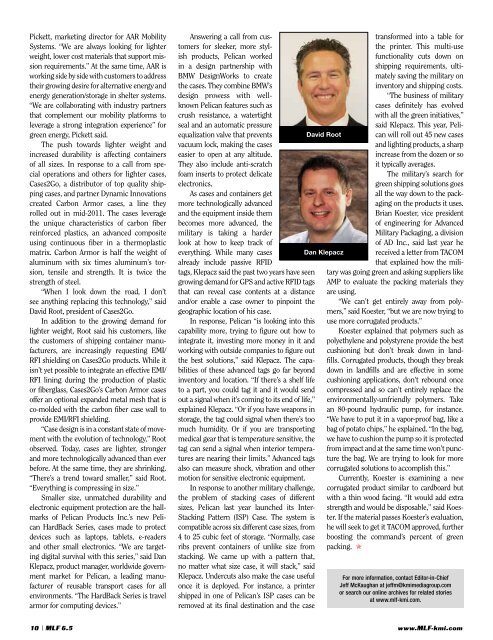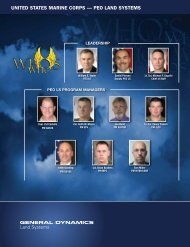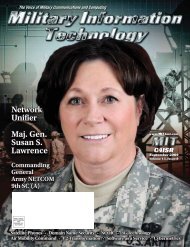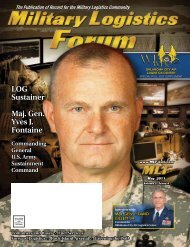Defense logistics agency issue - KMI Media Group
Defense logistics agency issue - KMI Media Group
Defense logistics agency issue - KMI Media Group
Create successful ePaper yourself
Turn your PDF publications into a flip-book with our unique Google optimized e-Paper software.
Pickett, marketing director for AAR Mobility<br />
Systems. “We are always looking for lighter<br />
weight, lower cost materials that support mission<br />
requirements.” At the same time, AAR is<br />
working side by side with customers to address<br />
their growing desire for alternative energy and<br />
energy generation/storage in shelter systems.<br />
“We are collaborating with industry partners<br />
that complement our mobility platforms to<br />
leverage a strong integration experience” for<br />
green energy, Pickett said.<br />
The push towards lighter weight and<br />
increased durability is affecting containers<br />
of all sizes. In response to a call from special<br />
operations and others for lighter cases,<br />
Cases2Go, a distributor of top quality shipping<br />
cases, and partner Dynamic Innovations<br />
created Carbon Armor cases, a line they<br />
rolled out in mid-2011. The cases leverage<br />
the unique characteristics of carbon fiber<br />
reinforced plastics, an advanced composite<br />
using continuous fiber in a thermoplastic<br />
matrix. Carbon Armor is half the weight of<br />
aluminum with six times aluminum’s torsion,<br />
tensile and strength. It is twice the<br />
strength of steel.<br />
“When I look down the road, I don’t<br />
see anything replacing this technology,” said<br />
David Root, president of Cases2Go.<br />
In addition to the growing demand for<br />
lighter weight, Root said his customers, like<br />
the customers of shipping container manufacturers,<br />
are increasingly requesting EMI/<br />
RFI shielding on Cases2Go products. While it<br />
isn’t yet possible to integrate an effective EMI/<br />
RFI lining during the production of plastic<br />
or fiberglass, Cases2Go’s Carbon Armor cases<br />
offer an optional expanded metal mesh that is<br />
co-molded with the carbon fiber case wall to<br />
provide EMI/RFI shielding.<br />
“Case design is in a constant state of movement<br />
with the evolution of technology,” Root<br />
observed. Today, cases are lighter, stronger<br />
and more technologically advanced than ever<br />
before. At the same time, they are shrinking.<br />
“There’s a trend toward smaller,” said Root.<br />
“Everything is compressing in size.”<br />
Smaller size, unmatched durability and<br />
electronic equipment protection are the hallmarks<br />
of Pelican Products Inc.’s new Pelican<br />
HardBack Series, cases made to protect<br />
devices such as laptops, tablets, e-readers<br />
and other small electronics. “We are targeting<br />
digital survival with this series,” said Dan<br />
Klepacz, product manager, worldwide government<br />
market for Pelican, a leading manufacturer<br />
of reusable transport cases for all<br />
environments. “The HardBack Series is travel<br />
armor for computing devices.”<br />
10 | MLF 6.5<br />
Answering a call from customers<br />
for sleeker, more stylish<br />
products, Pelican worked<br />
in a design partnership with<br />
BMW DesignWorks to create<br />
the cases. They combine BMW’s<br />
design prowess with wellknown<br />
Pelican features such as<br />
crush resistance, a watertight<br />
seal and an automatic pressure<br />
equalization valve that prevents<br />
vacuum lock, making the cases<br />
easier to open at any altitude.<br />
They also include anti-scratch<br />
foam inserts to protect delicate<br />
electronics.<br />
As cases and containers get<br />
more technologically advanced<br />
and the equipment inside them<br />
becomes more advanced, the<br />
military is taking a harder<br />
look at how to keep track of<br />
everything. While many cases<br />
already include passive RFID<br />
tags, Klepacz said the past two years have seen<br />
growing demand for GPS and active RFID tags<br />
that can reveal case contents at a distance<br />
and/or enable a case owner to pinpoint the<br />
geographic location of his case.<br />
In response, Pelican “is looking into this<br />
capability more, trying to figure out how to<br />
integrate it, investing more money in it and<br />
working with outside companies to figure out<br />
the best solutions,” said Klepacz. The capabilities<br />
of these advanced tags go far beyond<br />
inventory and location. “If there’s a shelf life<br />
to a part, you could tag it and it would send<br />
out a signal when it’s coming to its end of life,”<br />
explained Klepacz. “Or if you have weapons in<br />
storage, the tag could signal when there’s too<br />
much humidity. Or if you are transporting<br />
medical gear that is temperature sensitive, the<br />
tag can send a signal when interior temperatures<br />
are nearing their limits.” Advanced tags<br />
also can measure shock, vibration and other<br />
motion for sensitive electronic equipment.<br />
In response to another military challenge,<br />
the problem of stacking cases of different<br />
sizes, Pelican last year launched its Inter-<br />
Stacking Pattern (ISP) Case. The system is<br />
compatible across six different case sizes, from<br />
4 to 25 cubic feet of storage. “Normally, case<br />
ribs prevent containers of unlike size from<br />
stacking. We came up with a pattern that,<br />
no matter what size case, it will stack,” said<br />
Klepacz. Undercuts also make the case useful<br />
once it is deployed. For instance, a printer<br />
shipped in one of Pelican’s ISP cases can be<br />
removed at its final destination and the case<br />
David Root<br />
Dan Klepacz<br />
transformed into a table for<br />
the printer. This multi-use<br />
functionality cuts down on<br />
shipping requirements, ultimately<br />
saving the military on<br />
inventory and shipping costs.<br />
“The business of military<br />
cases definitely has evolved<br />
with all the green initiatives,”<br />
said Klepacz. This year, Pelican<br />
will roll out 45 new cases<br />
and lighting products, a sharp<br />
increase from the dozen or so<br />
it typically averages.<br />
The military’s search for<br />
green shipping solutions goes<br />
all the way down to the packaging<br />
on the products it uses.<br />
Brian Koester, vice president<br />
of engineering for Advanced<br />
Military Packaging, a division<br />
of AD Inc., said last year he<br />
received a letter from TACOM<br />
that explained how the military<br />
was going green and asking suppliers like<br />
AMP to evaluate the packing materials they<br />
are using.<br />
“We can’t get entirely away from polymers,”<br />
said Koester, “but we are now trying to<br />
use more corrugated products.”<br />
Koester explained that polymers such as<br />
polyethylene and polystyrene provide the best<br />
cushioning but don’t break down in landfills.<br />
Corrugated products, though they break<br />
down in landfills and are effective in some<br />
cushioning applications, don’t rebound once<br />
compressed and so can’t entirely replace the<br />
environmentally-unfriendly polymers. Take<br />
an 80-pound hydraulic pump, for instance.<br />
“We have to put it in a vapor-proof bag, like a<br />
bag of potato chips,” he explained. “In the bag,<br />
we have to cushion the pump so it is protected<br />
from impact and at the same time won’t puncture<br />
the bag. We are trying to look for more<br />
corrugated solutions to accomplish this.”<br />
Currently, Koester is examining a new<br />
corrugated product similar to cardboard but<br />
with a thin wood facing. “It would add extra<br />
strength and would be disposable,” said Koester.<br />
If the material passes Koester’s evaluation,<br />
he will seek to get it TACOM approved, further<br />
boosting the command’s percent of green<br />
packing. O<br />
For more information, contact Editor-in-Chief<br />
Jeff McKaughan at jeffm@kmimediagroup.com<br />
or search our online archives for related stories<br />
at www.mlf-kmi.com.<br />
www.MLF-kmi.com
















